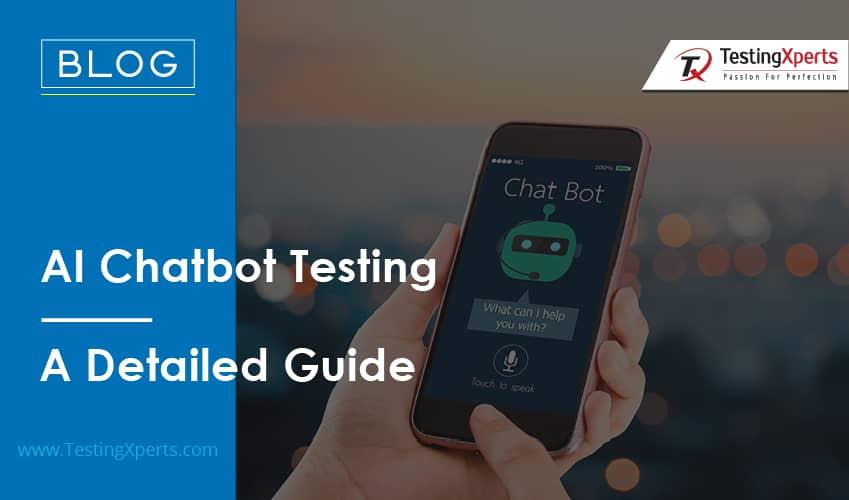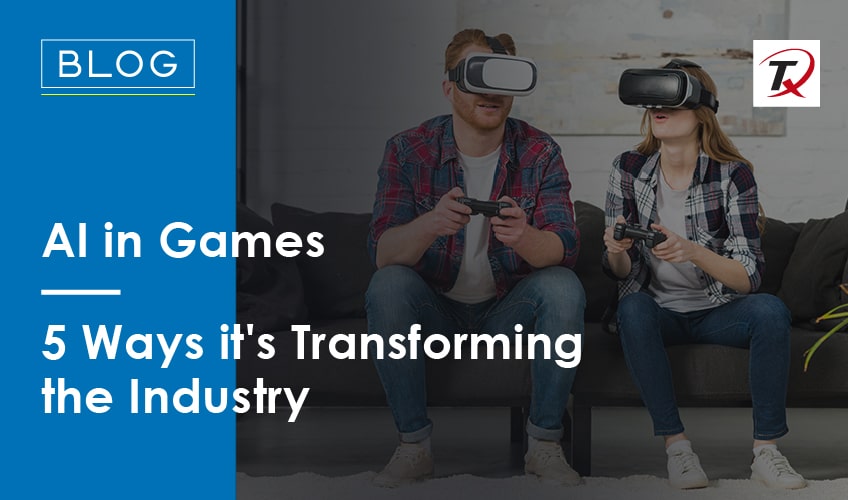
Table of Contents
The gaming industry has seen a lot of transformation since its inception. Back in the days when people had to pay quarters to play at arcades, the latest gaming tech that one can enjoy in the comfort of their home, this industry has come a long way. With AI, the gaming industry is taking yet another big jump forward. Breakthroughs like the Parworld success, Hell Divers 2, etc., are already opening doors for content generation. Integrating AI in games enhances gamers’ experiences and prevents hacking or cheating incidents in online gaming.
But the question is, “Why AI?” Well, 61% of game developers are now using AI to create player-centric elements, which boosts engagement by 29%. This is because AI can create immersive, personalized, dynamic, and graphic-oriented gaming elements. Also, 87% of video game developers suggested a shift towards more AI-driven game development processes. From enhancing gameplay to optimizing game design and storytelling, AI is slowly becoming a core aspect of the gaming industry.
Role of AI in Games
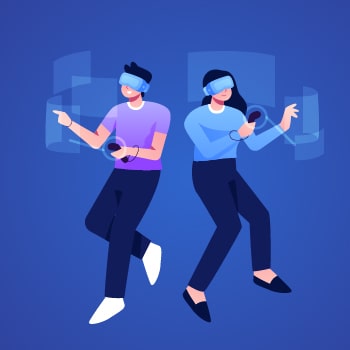
AI has the potential to completely transform the gaming industry, from how games are developed to the experience they offer. It can unlock new possibilities regarding graphics, scale, realism, gameplay, and physics dynamics and change the gaming we all know. Gen AI, a subset of AI, uses algorithms to generate content, such as levels, characters, and environment. It significantly reduces the time and effort needed to develop games, allowing developers to focus on other critical aspects. Gen AI analyzes the existing elements (learning patterns and rules from the data) to generate new content. For example, it can create unique levels in mission-based games by analyzing the difficulty and designs of existing levels and ensuring they follow the same principles.
In the early years of video game development, developers manually created every aspect of the game world (terrain, environment, characters, storyline, etc.). Now, Gen AI can generate entire game worlds automatically, saving resources and time and allowing developers to focus on immersive tasks. Minecraft, Palworld, Hell Divers 2, etc., are excellent examples of Gen AI generating various elements, including caves, structures, terrain, etc.
Another example of AI usage in video games is the development of NPCs. Previously, NPCs were very simple, with limited actions and behaviors. With AI, NPCs have become more interactive and have unique personalities, behaviors, and actions. This makes the game more realistic, dynamic, and engaging, giving games a memorable experience. It can also generate dynamic missions or quests that sync with the player’s actions and decisions. This creates a personalized and realistic experience for each player (which would enhance further if it’s a VR-based game). AI can also analyze player preferences and gameplay to enable developers to make informed design decisions. Having a clear understanding of gamers’ preferences, developers can make games more appealing and engaging. It will improve player retention rates and help them create a successful game.
How AI is Transforming the Gaming Industry?
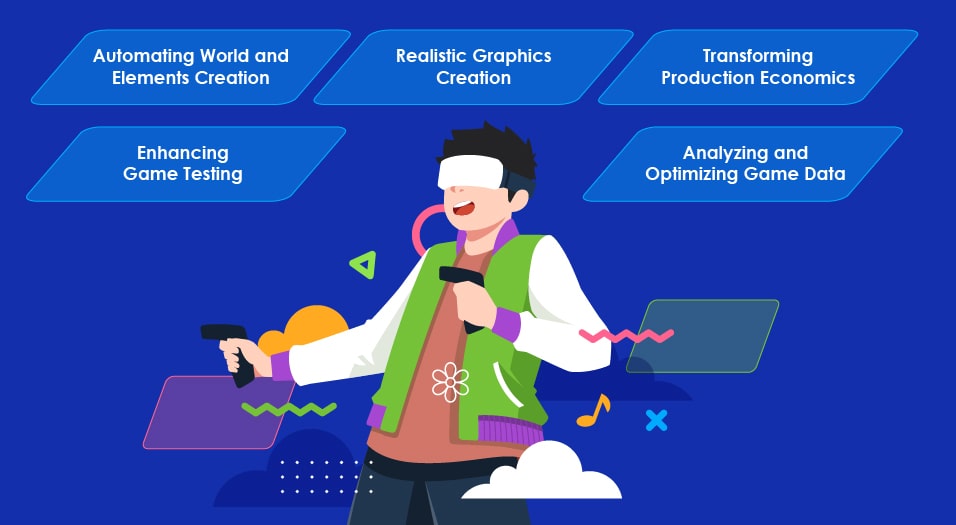
Integrating AI into the gaming industry significantly shifts how games are developed, played, and experienced. It drives innovation and creates new possibilities for both developers and gamers alike. The following are the top 5 factors showing how AI is transforming the gaming industry:
Automating World and Elements Creation
Manually creating a complex 3D game world with detailed elements and ultra-high-resolution graphics requires immense resources and time investment. AI tools use algorithms to automate this process to generate worlds, models, fields, textures, objects, and other assets. Developers can rapidly create high-quality and vivid game environments, which would be time-consuming if done manually. For instance, AI can analyze real-world data and terrain details to generate 3D elements like buildings, roads, grasslands, etc., for an open-world game. It can use factors like accessibility, optimal space usage, axis, cover opportunities, and sight lines to create structures for compelling gameplay. AI can also replicate real-world designs and layouts to create authentic visuals.
Realistic Graphics Creation
Although a graphically sophisticated game is large, it could have noticeable texture and object rendering limitations. AI tools like Nvidia GauGAN can analyze and use landscape imagery data to replicate near-photorealistic graphics and environmental renderings. This would allow gamers to experience game worlds with ultra-visual fidelity and vast open worlds without texture repetition. Effects like shadow quality, weather patterns, motion blur, fire effects, etc., can also appear realistic rather than programmatic.
Transforming Production Economics
Let’s look at some real-world examples of production costs in the gaming world. Red Dead Redemption 2, developed by Rockstar Games at a budget of $540 million, was a massive hit in multiple games. Another example is Cyberpunk 2077, developed by CD Projekt Red, with a budget of $436 million. These numbers highlight the steep financial commitment necessary for producing quality content. Although these games were a big hit, they collected a huge profit. However, AI technologies can significantly reduce these costs by facilitating art creation and voice synthesis. For instance, developing the Palworld game cost less than $7 million. The developers used an AI-driven approach for content creation.
Enhancing Game Testing
AI-driven testing tools can run games continuously, learn rules, and identify issues quicker than human testers. It makes games more polished at launch, with fewer bugs and better overall quality. Using AI in testing will ensure gamers have a smoother, more reliable, more secure, and more seamless gaming experience.
Analyzing and Optimizing Game Data
AI algorithms can analyze game data, such as audio files, graphic settings, physics, 3D meshes, terrain, etc., to compress them without affecting visuals, sound quality, gameplay, or game texture. This can help improve game performance, supporting faster loading times and seamless gameplay. AI dynamically allocates in-game resources by performing real-time performance analysis. It will ensure that the game utilizes computing power in an efficient and optimal manner.
Challenges and Solutions
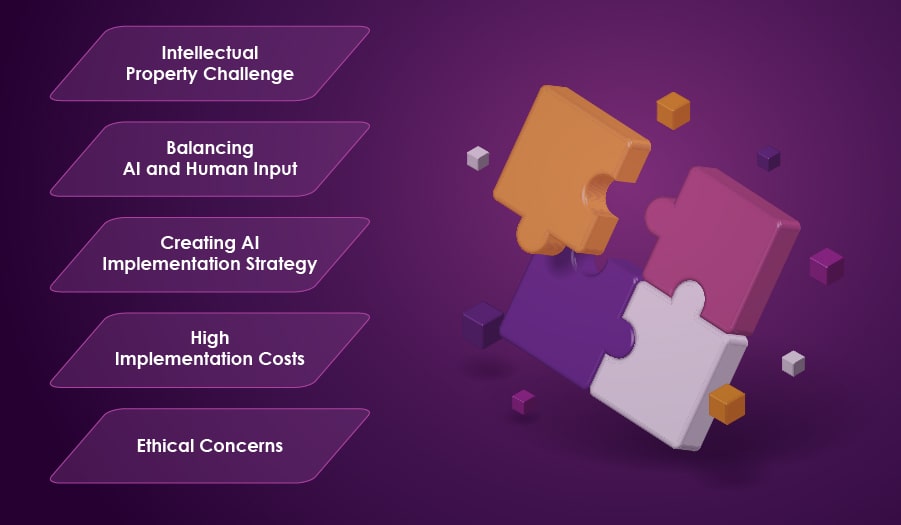
Integrating AI in the Gaming industry comes with a set of challenges that companies must address to utilize the full potential of game AI. They also need to ensure that the technology is used ethically and responsibly. Following are some of the challenges associated with AI integration in video games:
Intellectual Property Challenge
Intellectual property is one of the primary concerns in AI usage in game development. Developers must consider AI-generated content’s impact on ownership rights and copyright protection. However, drafting proper guidelines and policies would allow game-developing companies to manage this concern while reaping AI benefits.
Balancing AI and Human Input
Over-reliance on AI could make games feel too automated and impersonal. This is why it’s necessary to maintain a balance between AI-enhancing gaming experiences without overshadowing human inputs. Integrating AI to complement human input rather than replace it would make games more engaging and player-centric.
Creating AI Implementation Strategy
Another challenge is drafting clear AI implementation strategies in the gaming industry. Companies must balance ethical and technical considerations while considering gamers, business, and game requirements. A proactive and detailed implementation approach would allow companies to utilize AI’s full capabilities and optimize the gaming experience.
High Implementation Costs
Integrating AI into game mechanics can be expensive, especially for small developers. The cost includes hardware, software, and specialized personnel requirements. Developers can leverage open-source AI tools and platforms as they are less expensive and continuously improved by global community contributions.
Ethical Concerns
AI utilization in games raises concerns regarding hacking, ethical issues (particularly data privacy), and AI’s capability to learn and propagate compromised behaviors. Developers must establish clear ethical guidelines and implement advanced AI practices to prevent players from using hacks in the game. It will also ensure that AI systems implement good protective measures to prevent them from learning or acting on biased data. Having regular audits and updates can also help maintain these standards.
How can Tx help with AI Testing?

The gaming industry is experiencing an intense transformation with AI integration. It has changed how gamers perceive, interact, and understand gaming content, which is why gaming companies are heavily investing in this tech innovation. With its deep knowledge of the AI domain and proven track record of implementation projects, Tx can assist you with AI-based game testing. Partnering with Tx will give you the following benefits:
• Team with years of experience in various testing domains, including functional, performance, UI/UX, security, and compliance testing.
• Seamless implementation of test automation framework to increase test efficiency for repetitive and time-consuming tasks.
• 30+ person-years of collective experience in utilizing AI tools to provide intelligent automation solutions and handle the complexity of AI testing.
• Comprehensive user acceptance testing to ensure your application meets the expectations and needs of its target audience.
• Experience enabling CI/CD pipelines using industry-standard tools and our in-house accelerator Tx-DevOps.
• Expert in utilizing AI for test automation using partner tools and in-house accelerators to deliver advanced AI testing solutions tailored to your project needs.
To know more, contact our AI testing experts now.
Summary
What does the future of AI in the gaming industry look like? The possibilities are endless. We expect more challenging, graphic-oriented, and engaging games as AI technology improves. For businesses in the gaming industry, this is an exciting opportunity to invest. A facilitates the creation of dynamic, immersive worlds and complex NPC behavior, making games more realistic and engaging. It also streamlines development processes and helps deliver a personalized gaming experience. However, gaming companies should partner with a professional AI expert like Tx to ensure its successful integration.
Discover more
Get in Touch
Stay Updated
Subscribe for more info



